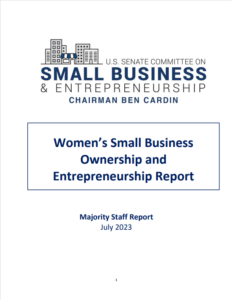 Women’s Small Business Ownership and Entrepreneurship Report
Women’s Small Business Ownership and Entrepreneurship Report
Majority Staff Report
U.S. Senate Committee on Small Business & Entrepreneurship
First published July 2023
Women represent more than half of the United States population and make significant contributions across all industries and sectors. Americans filed about 5.1 million business applications in 2022, nearly 14,000 a day, up from 3.5 million in 2019. That compares to just 29 percent of all business filings pre-pandemic. Women in particular have been the driving force behind America’s economic rebound from the COVID-19 pandemic, creating about half of new businesses for the third year in a row. Women of color, specifically Black women, have had a tremendous impact on the post-pandemic economy with the number of Black-women-owned employer businesses increasing to around 18 percent from 2017-2020, compared to a 9 percent increase in the number of women-owned businesses. According to an analysis produced by the Boston Consulting Group, if women participated equally to men as entrepreneurs, global Gross Domestic Product (GDP) could increase by approximately 3 to 6 percent, adding $2.5 to $5 trillion to the global economy.
While these statistics are important and impressive, more can be done to ensure women entrepreneurs and small business owners can continue on the path to business success and economic independence. Women, particularly those from minority communities, continue to face persistent barriers to entrepreneurial success that make achieving their professional and personal ambitions more difficult than their male counterparts. The following report was prepared by the majority staff of the Senate Committee on Small Business and Entrepreneurship to understand the challenges women entrepreneurs face at a time when women are making important economic strides. The report examines obstacles including:
- Access to capital, and particularly to venture capital that could make a small business the next great American business;
- Childcare access and affordability;
- A gap in mentoring opportunities that could help women start their journey to entrepreneurship or advance their business interests.
Download Resource
